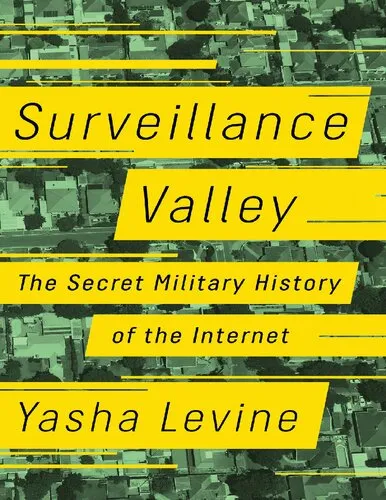The future of foreign intelligence : privacy and surveillance in a digital age
3.7
بر اساس نظر کاربران

شما میتونید سوالاتتون در باره کتاب رو از هوش مصنوعیش بعد از ورود بپرسید
هر دانلود یا پرسش از هوش مصنوعی 2 امتیاز لازم دارد، برای بدست آوردن امتیاز رایگان، به صفحه ی راهنمای امتیازات سر بزنید و یک سری کار ارزشمند انجام بدینکتاب های مرتبط:
Persian Summary
مقدمهای بر کتاب
کتاب «آینده اطلاعات خارجی: حفظ حریم خصوصی و نظارت در عصر دیجیتال» نوشته لاورا دوناهو، به بررسی چالشها و فرصتهایی میپردازد که فناوریهای نوین در زمینه اطلاعات خارجی و حفظ حریم خصوصی به وجود آوردهاند. در عصر دیجیتال، نظارت و اطلاعات خواهی به سطحی بیسابقه رسیده است و این کتاب با نگاهی حقوقی و اجتماعی به تحلیل این تغییرات پرداخته و راهکارهایی برای بهبود وضعیت فعلی ارائه میدهد.
خلاصهای جامع از کتاب
این کتاب به تحلیل جامع از چهارچوبهای قانونی و چالشهای پیش روی حفاظت از حریم خصوصی در مقابل نظارتهای دولتی میپردازد. با بررسی قوانین مختلف در ایالات متحده و تطابق آن با تحولاتی که در حوزه فناوری رخ دادهاند، نویسنده سعی دارد تا تأثیرات این قوانین بر جامعه و فرد را برای خواننده روشن کند. پیشرفتهایی که در حوزه Data Mining، تحلیل کلاندادهها و نظارت در سطح جهانی وجود دارد، بخش عمدهای از این کتاب را تشکیل میدهند.
نکات کلیدی کتاب
- تأثیرات فناوری پیشرفته بر نظارت و اطلاعات خواهی.
- تضاد میان امنیت ملی و حریم خصوصی فردی.
- بحثهای حقوقی پیرامون تضادهای قانونی موجود در قوانین فعلی.
- راهکارهایی برای بهینهسازی نظارتها در راستای حفظ حقوق انسانی.
نقلقولهای برجسته از کتاب
"با پیشرفت تکنولوژی، نظارتها نیز باید به گونهای اصلاح شوند که حقوق اساسی افراد نیز محترم شمرده شود."
"چالش اصلی عصر دیجیتال، همسازی میان پیشرفتهای فناوری و ارزشهای اجتماعی است."
چرا این کتاب مهم است
این کتاب بهواسطه تحلیلهای عمیق و علمی خود، ابزاری مناسب برای درک بهتر تغییراتی است که فناوری در حوزه نظارت و اطلاعات خواهی ایجاد کرده است. برای سیاستگذاران، محققین و حتی عموم مردم، این کتاب میتواند چشمی به روی واقعیتهای پنهان شبکهها و سیستمهای نظارتی باز کند و آنها را در مسیر آگاهیبخشی و آموزش حقوق فردی راهنمایی کند. در کل، «آینده اطلاعات خارجی: حفظ حریم خصوصی و نظارت در عصر دیجیتال» یکی از مهمترین آثاری است که به بررسی ابعاد مختلف تأثیر فناوری بر جامعه و حقوق بشر میپردازد.
Welcome to a comprehensive exploration of the intricate interplay between privacy and national security in the digital age. In "The Future of Foreign Intelligence: Privacy and Surveillance in a Digital Age," Laura K. Donohue delves into the legal, ethical, and technological challenges that redefine how nations conduct surveillance, balance civil liberties, and ensure security.
Detailed Summary of the Book
In recent years, technological advancements have dramatically transformed the landscape of national security and intelligence gathering. Laura K. Donohue's influential work sheds light on these changes by analyzing their implications for foreign intelligence operations and privacy rights. The book provides a historical perspective, tracing the evolution of surveillance practices alongside the domestic and international legal frameworks that govern them.
Donohue meticulously examines the tension between national security imperatives and the fundamental right to privacy. She discusses how the digital age has expanded the reach of surveillance tools and the consequent need for robust accountability mechanisms. The book provides a critical evaluation of existing and emerging legal frameworks, such as the Foreign Intelligence Surveillance Act (FISA), and prompts readers to consider the effectiveness and ethical dimensions of bulk data collection, signal intelligence, and cyber operations.
By exploring case studies and landmark court decisions, Donohue outlines the challenges faced by policymakers and judicial systems in addressing the complexity of digital surveillance. The book closes by envisioning a future where technological capabilities are harnessed responsibly, safeguarding privacy while fortifying national security.
Key Takeaways
- Surveillance has crossed traditional boundaries, with digital tools providing unprecedented access to personal data.
- The balance between national security and individual privacy often leans towards security, presenting significant ethical challenges.
- Legal frameworks struggle to keep pace with technological advancements, necessitating continuous review and adaptation.
- New forms of oversight could enhance accountability and transparency in intelligence operations.
- Understanding the global implications of national surveillance practices is crucial for effective international cooperation.
Famous Quotes from the Book
“In the digital era, the mechanisms of state surveillance have evolved to a point where they permeate everyday life, challenging the pillars of privacy and democratic governance.”
“While the tools of surveillance have grown more sophisticated, so too must the legal and ethical frameworks that govern them.”
“Privacy does not obstruct security; instead, it strengthens the very foundations of a free and democratic society.”
Why This Book Matters
"The Future of Foreign Intelligence" is an essential read for policymakers, legal scholars, and citizens alike. As digital surveillance becomes more pervasive, understanding its implications is crucial for safeguarding civil liberties and fostering democratic principles. Laura K. Donohue's book provides a thorough jurisprudential and ethical analysis that challenges us to rethink the relationship between technology, security, and freedom.
This work not only elucidates current dilemmas but also advocates for a balanced approach to intelligence operations — one that respects individual rights while addressing national threats. It is a pivotal resource in the ongoing dialogue about the future of privacy and surveillance, guiding readers towards informed, constructive engagement with one of the most pressing issues of our time.
Through thoughtful critique and innovative perspectives, Donohue equips us with the knowledge to navigate the complexities of a rapidly evolving digital landscape. Her book stands out as a vital tool for understanding the stakes at hand and the potential pathways forward.
دانلود رایگان مستقیم
شما میتونید سوالاتتون در باره کتاب رو از هوش مصنوعیش بعد از ورود بپرسید
دسترسی به کتابها از طریق پلتفرمهای قانونی و کتابخانههای عمومی نه تنها از حقوق نویسندگان و ناشران حمایت میکند، بلکه به پایداری فرهنگ کتابخوانی نیز کمک میرساند. پیش از دانلود، لحظهای به بررسی این گزینهها فکر کنید.
این کتاب رو در پلتفرم های دیگه ببینید
WorldCat به شما کمک میکنه تا کتاب ها رو در کتابخانه های سراسر دنیا پیدا کنید
امتیازها، نظرات تخصصی و صحبت ها درباره کتاب را در Goodreads ببینید
کتابهای کمیاب یا دست دوم را در AbeBooks پیدا کنید و بخرید











